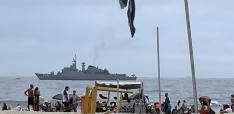ISIS Hijacked a Legitimate Source of Pride
Karl Muth reveals how ISIS attempts to allude to a past it fails to understand.
The final S in the abbreviation ISIS stands for Syria (al-Dawlah al-Islāmīyah fī al-ʻIraq wa-al-Shām). But not for the sovereign Syrian state we know today. Instead, it stands for an ancient Syria, one that saw most of contemporary Lebanon within its ambit. This Syria, one of the most scientifically-advanced places in the world at the time, is admired by many, including this author.
I read a great deal about the Crusades - from Christian and non-Christian perspectives - over the past ten years. One account that sticks with me is from a young nobleman of Saxon ancestry, of a brittle European sword being literally smashed to pieces upon meeting a forged Damascus blade. Horrified, the man retreated. He incorrectly, however, thought the metal his mounted band encountered in battle was a unique substance found in Arab lands. Rather, it was the result of a technology (early fold forging created what we now call nanowires, giving these blades extraordinary hardness but also superplastic flexible properties under stress).
ISIS is not particularly interested in developing technologies; it is closer to the barbarians who sacked ancient Baghdad than the merchants who built the famous Bazaar of Baghdad. ISIS is made up primarily of failed soldiers, illiterate bullies, unemployed goons, and unimaginative Luddites. Its average constituent would struggle to explain even the technology of the Twelfth Century (the time of the legendary Bazaar’s demise).
But this is why embracing the concept of advanced, ancient Syria is so important and powerful. It is the opposite of ISIS, but a needed component of ISIS’s mythology.
The problem is that the enormous scientific achievements seen in Syria during that period happened as science does today: in spite of extremism, not because of it. In ISIS’s attempt to recall the Islamic Golden Age (roughly 700AD until the Mongolian advance across the Tigris) fails here, as its current politics run counter to the things that would make a second Islamic Golden Age possible.
In order for there to be a successful Islamic state in the tradition of the first, there would have to be half a dozen conditions that cannot exist under an IS caliphate.
The enormous technological progress in applied mathematics, metallurgy, ceramics, architecture, civil engineering, and so on was not fully private in its financing; governments invested heavily in individual inventors and industrial cooperatives. Enormous investments were also made in capital equipment (including the original forge of Damascus) and the securing and distribution of intellectual property (including the first technical engineering library in the world, at Tripoli, which focused on civil engineering and architectural standards).
Perhaps most importantly, and also unimaginable under ISIS’s rule, was a persistent investment in multiculturalism, polylingualism, and the translation of foreign concepts from Europe and Asia. This included the literal translation of massive amounts of information into newly-standardised Arabic (not to be confused with Modern Standard Arabic). The system was “open source” and Wikipedia-like, with scholars contributing entire lifetimes to the effort; the major works of Aristotelian philosophy were translated to Arabic, and Chinese philosophers were welcomed to give speeches which were translated and distributed in Arabic. Jewish philosophers like Moses Maimonides were invited into the Arab world and welcomed, their philosophical arguments translated and debated in the places we know as Baghdad, Cairo, and Damascus.
Unlike the kleptocratic cartel tariff system imposed by ISIS on oil and other items, the Islamic Golden Age relied on free trade zones, several of which still exist (the Creek District in Dubai, or Khor Dubayy, is considered by many economic historians to be the oldest continuous designated free trade zone in the world). By allowing tax-free trade (including trade of items that would otherwise be considered contraband under local law), foreign cultures and alien businesspeople were drawn to places they would not otherwise do business. This brought an exchange of ideas and an influx of talent that was unimaginable only a century earlier. It also brought the possibility of establishing foreign businesses inside the free trade zones, including hospitals (which brought with them Chinese and Indian advancements in medicine) and research institutions (including, famously, the University of Al Karaouine, the world’s oldest degree-granting university and the first formal university institution founded by an international consortium of benefactors interested in philosophy, logic, religion, and the scientific method).
The ancient Syria, the one that trails ISIS’s acronym, is something to be revived and something we should all aspire to see in our lifetimes. But it is the polar opposite of the society ISIS offers to create.


